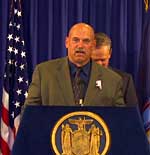Preparing for bioterrorism takes on new urgency for Minnesota officials
By Tom Scheck
MPR Health Reporter
Minnesota Public Radio
October 17, 2001
Officials will test several areas of the state Capitol, the governor's residence on Summit Ave., and Ventura's Maple Grove ranch for anthrax. The tests follow news that anthrax spores were discovered in New York Gov. George Pataki's office. Ventura, members of his staff and several Minnesota reporters visited the office two weeks ago. Meanwhile, some Minnesota lawmakers and staffers in the nation's Capitol say they're undergoing tests for exposure to the bacteria.
Throughout the afternoon, health investigators swept the Capitol building for anthrax spores. Ventura spokesman John Wodele says they'll conduct anthrax tests in the Capitol mail room, Ventura's office suite and the press room.
He says the governor's office, the Department of Public Safety and Capitol security decided to conduct the tests solely as a precaution.
Wodele says Ventura ordered the tests so his staff and others in the Capitol area feel secure. "He realizes the risk that some people might be alarmed by this, but every time we talk about it we have to say that it's only precautionary and there's no evidence of a threat," Wodele said.
Wodele says they've also taken steps to limit any potential anthrax exposures through the mail by opening and sorting all mail in the Capitol mail room. He says that precaution could prevent any potential exposure to other offices.
Wodele didn't say what initiated the decision to conduct the anthrax investigation at the three buildings, but preliminary tests of New York Gov. George Pataki's Manhattan office have shown traces of the bacteria. Ventura, his wife Terry, Wodele and others in his staff were in Pataki's office on Oct. 3 when Ventura visited the city. Several members of the Minnesota press corps were also in Pataki's office at that time.
Wodele says his office has consulted with the New York Health Department and Minnesota state epidemiologist Harry Hull and decided that no one should be tested for exposure to anthrax or take antibiotics as a precaution. Hull says health officials are urging people who've been in Pataki's Manhattan office after October 10 to take antibiotics as a precaution. That's one full week after Ventura's visit.
"The air ventilation system is not a source of anthrax there. It was only an environmental culture, so the risk would be for cutaneous anthrax. We're not recommending cultures and we're not recommending antibiotics. We're recommending that if people become ill - and particularly if people develop signs on cutaneous anthrax - that they should visit their physician," Hull said.
But some of the reporters who covered Ventura's trip are still concerned that they have been exposed to anthrax. WCCO-TV's Pat Kessler says his company is urging him to get tested to see if he had any exposure to the bacteria. "The odds of me actually having been exposed, I think, are very low. However as a precaution, WCCO would like me to be tested just to be sure. It's simply because we were in Pataki's office. We spent a lot of time there. We were outside of ABC News. We were down near the site. There's a whole bunch of reasons why, but just to be sure they would like that to happen," Kessler said.
While Minnesota officials were conducting anthrax tests as a precaution, lawmakers and staffers at the nation's Capitol were undergoing tests after Senate Majority Leader Tom Daschle's office was exposed to anthrax through a letter.
Sen. Mark Dayton, DFL-Minn., says three members of his staff will be tested. Sen. Paul Wellstone, DFL-Minn., says six of his staff members have been tested already. Since his office is in the same building as Daschle's, Wellstone says he's recommending that everyone in his office be tested.
Wellstone says even though the anthrax scare has alarmed many lawmakers and others in Washington, he says they'll continue working through the ordeal. "What we're going to do here is to continue to do the work. My own hope is that we'll have votes this afternoon and tomorrow. I certainly intend to speak on the floor of the Senate," Wellstone said.
NEW URGENCY IN PREPARATIONS
With the threat of bioterrorism at an unprecedented level, nurses and doctors across the state are brushing up on rare diseases and being urged to view symptoms from a different light.
"We've turned that adage on its head given the times we're in right now," said Dr. Richard Danila, head of the Minnesota Health Department's acute disease investigation and control section. "When you hear hoofbeats think of zebras. If you're thinking of a zebra, call us immediately."
Minnesota hospital officials, doctors and other health professionals are bracing for the unthinkable: an outbreak of anthrax, botulism, smallpox or another deadly disease. On Tuesday, a bioterrorism refresher course beamed via the Internet around the state overflowed with participants, with people turned away at some sites.
Hospitals are reviewing security and emergency procedures,
including how to lock them down and free up bed space. State health
officials are encouraging hospitals to set up teams that include
everyone from doctors to purchasing managers who would have to
spring to action in a pinch.
"Traditionally, hospitals have prepared for the disaster - vis-a-vis the plane crash or the tornado," Danila said. "Now we're talking about a different kind of disaster - one that's not going to be, immediately you have 200 trauma patients."
For their part, the state health officials are assembling a small cache of antibiotics that could tide them over in an emergency until supplies from federal stockpiles arrive, which they've been assured would arrive within 12 hours. They're going over logistics, such as possibly setting up a pharmacy in an airport hangar to break down bulk packs of pills into individual patient doses.
To get the word out, the state would send out alerts via e-mail to the state's 87 county health departments, which would pass the information on to clinics, doctors and others in their area.
The Associated Press and MPR's Michael Khoo contributed to this report
By Tom Scheck
MPR Health Reporter
Minnesota Public Radio
October 17, 2001
|
| RealAudio |
| |
|
|
|
||
Wodele says Ventura ordered the tests so his staff and others in the Capitol area feel secure. "He realizes the risk that some people might be alarmed by this, but every time we talk about it we have to say that it's only precautionary and there's no evidence of a threat," Wodele said.
Wodele says they've also taken steps to limit any potential anthrax exposures through the mail by opening and sorting all mail in the Capitol mail room. He says that precaution could prevent any potential exposure to other offices.
Wodele didn't say what initiated the decision to conduct the anthrax investigation at the three buildings, but preliminary tests of New York Gov. George Pataki's Manhattan office have shown traces of the bacteria. Ventura, his wife Terry, Wodele and others in his staff were in Pataki's office on Oct. 3 when Ventura visited the city. Several members of the Minnesota press corps were also in Pataki's office at that time.
Wodele says his office has consulted with the New York Health Department and Minnesota state epidemiologist Harry Hull and decided that no one should be tested for exposure to anthrax or take antibiotics as a precaution. Hull says health officials are urging people who've been in Pataki's Manhattan office after October 10 to take antibiotics as a precaution. That's one full week after Ventura's visit.
"The air ventilation system is not a source of anthrax there. It was only an environmental culture, so the risk would be for cutaneous anthrax. We're not recommending cultures and we're not recommending antibiotics. We're recommending that if people become ill - and particularly if people develop signs on cutaneous anthrax - that they should visit their physician," Hull said.
But some of the reporters who covered Ventura's trip are still concerned that they have been exposed to anthrax. WCCO-TV's Pat Kessler says his company is urging him to get tested to see if he had any exposure to the bacteria. "The odds of me actually having been exposed, I think, are very low. However as a precaution, WCCO would like me to be tested just to be sure. It's simply because we were in Pataki's office. We spent a lot of time there. We were outside of ABC News. We were down near the site. There's a whole bunch of reasons why, but just to be sure they would like that to happen," Kessler said.
| |
|
|
|
||
Sen. Mark Dayton, DFL-Minn., says three members of his staff will be tested. Sen. Paul Wellstone, DFL-Minn., says six of his staff members have been tested already. Since his office is in the same building as Daschle's, Wellstone says he's recommending that everyone in his office be tested.
Wellstone says even though the anthrax scare has alarmed many lawmakers and others in Washington, he says they'll continue working through the ordeal. "What we're going to do here is to continue to do the work. My own hope is that we'll have votes this afternoon and tomorrow. I certainly intend to speak on the floor of the Senate," Wellstone said.
NEW URGENCY IN PREPARATIONS
With the threat of bioterrorism at an unprecedented level, nurses and doctors across the state are brushing up on rare diseases and being urged to view symptoms from a different light.
"We've turned that adage on its head given the times we're in right now," said Dr. Richard Danila, head of the Minnesota Health Department's acute disease investigation and control section. "When you hear hoofbeats think of zebras. If you're thinking of a zebra, call us immediately."
Minnesota hospital officials, doctors and other health professionals are bracing for the unthinkable: an outbreak of anthrax, botulism, smallpox or another deadly disease. On Tuesday, a bioterrorism refresher course beamed via the Internet around the state overflowed with participants, with people turned away at some sites.
| |
|
|
|
||
"Traditionally, hospitals have prepared for the disaster - vis-a-vis the plane crash or the tornado," Danila said. "Now we're talking about a different kind of disaster - one that's not going to be, immediately you have 200 trauma patients."
For their part, the state health officials are assembling a small cache of antibiotics that could tide them over in an emergency until supplies from federal stockpiles arrive, which they've been assured would arrive within 12 hours. They're going over logistics, such as possibly setting up a pharmacy in an airport hangar to break down bulk packs of pills into individual patient doses.
To get the word out, the state would send out alerts via e-mail to the state's 87 county health departments, which would pass the information on to clinics, doctors and others in their area.
The Associated Press and MPR's Michael Khoo contributed to this report



